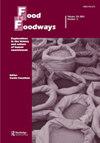Vanns spices: Blending food, women’s friendship and business in 1980s Baltimore
IF 1.1
Q2 ANTHROPOLOGY
引用次数: 1
Abstract
Abstract In 1981 friends and female entrepreneurs Virginia Limansky and Ann Wilder launched a boutique spice business in Baltimore. The company’s name was a fusion of their first names, Virginia and Ann, and the business initially developed out of their home kitchens. Vanns created popular spice blends of high quality and flourished despite being located in the shadow of nearby spice giant McCormick. It began by offering six spice blends; today the company boasts over 350 spices, herbs and seasoning blends. By focusing on Vanns’ first years, this study first explores what prompted one of its female co-founders to create its foundational spice blends and then withdraw from the enterprise precisely as the business took flight. Next it looks to what circumstances contributed to the business’ early success, and with only one exception, to ways these women entrepreneurs found to transform potential obstacles to Vanns’ success into business opportunities. Finally, this story of Vanns, incorporating detail available through recent access to Val Limansky’s private papers and personal interviews, reintroduces Val Limansky to the story of the business she co-founded, which continues to operate in Maryland today. It also adds particularity to existing accounts of Baltimore’s social and food landscape in the 80s, and of the gourmetization of foodways in America during the 80s and 90s.范斯香料:混合食物,女性的友谊和商业在20世纪80年代的巴尔的摩
摘要1981年,弗吉尼亚·利曼斯基和安·怀尔德的朋友和女企业家在巴尔的摩创办了一家精品香料公司。该公司的名字融合了他们的名字,弗吉尼亚和安,业务最初是在他们的家庭厨房发展起来的。Vanns创造了受欢迎的高质量香料混合物,尽管位于附近香料巨头麦考密克的阴影下,但它仍然蓬勃发展。它最初提供六种混合香料;如今,该公司拥有超过350种香料、草药和混合调味料。通过关注Vanns的最初几年,这项研究首先探讨了是什么促使其一位女性联合创始人创建了其基础香料混合物,然后在业务起飞时退出了企业。接下来,我们将探讨是什么情况促成了企业的早期成功,只有一个例外,即这些女企业家如何将Vanns成功的潜在障碍转化为商业机会。最后,这个关于Vanns的故事,结合了最近访问Val Limansky的私人文件和个人采访中的细节,将Val Limmansky重新介绍给了她共同创立的公司的故事,该公司至今仍在马里兰州运营。它还增加了对80年代巴尔的摩社会和食品景观的现有描述,以及80年代和90年代美国美食的美食家化。
本文章由计算机程序翻译,如有差异,请以英文原文为准。
求助全文
约1分钟内获得全文
求助全文
来源期刊

Food and Foodways
ANTHROPOLOGY-
CiteScore
2.20
自引率
0.00%
发文量
16
期刊介绍:
Food and Foodways is a refereed, interdisciplinary, and international journal devoted to publishing original scholarly articles on the history and culture of human nourishment. By reflecting on the role food plays in human relations, this unique journal explores the powerful but often subtle ways in which food has shaped, and shapes, our lives socially, economically, politically, mentally, nutritionally, and morally. Because food is a pervasive social phenomenon, it cannot be approached by any one discipline. We encourage articles that engage dialogue, debate, and exchange across disciplines.
 求助内容:
求助内容: 应助结果提醒方式:
应助结果提醒方式:


